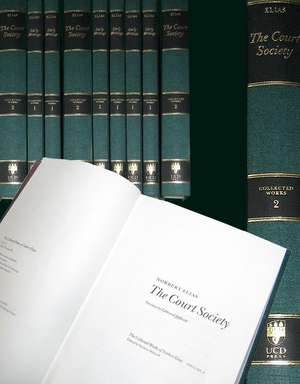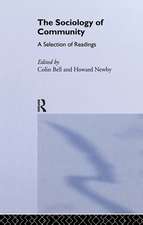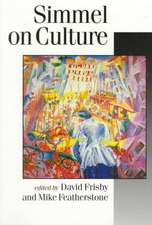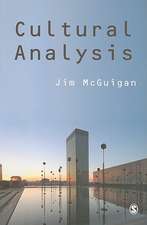The Symbol Theory: The Collected Works of Norbert Elias, cartea 13
Autor Norbert Eliasen Limba Engleză Hardback – 8 mai 2011
"The Symbol Theory, volume 13 in "The Collected Works of Norbert Elias", situates the human capacity for forming symbols in the long-term biological evolution of Homo sapiens, showing how it is linked through communication and orientation to group survival. Elias proceeds to recast the question of the ontological status of knowledge, moving beyond the old philosophical dualisms of idealism/materialism and subject/object. He readjusts the boundary between the 'social' and the 'natural' by interweaving evolutionary biology and the social sciences. "The Symbol Theory" provides nothing less than a new image of the human condition as an accidental outcome of the blind flux of an indifferent cosmos. Elias' Introduction now includes previously unpublished passages written in the days before he died.
Preț: 415.80 lei
Nou
Puncte Express: 624
Preț estimativ în valută:
79.56€ • 83.28$ • 66.22£
79.56€ • 83.28$ • 66.22£
Carte indisponibilă temporar
Doresc să fiu notificat când acest titlu va fi disponibil:
Se trimite...
Preluare comenzi: 021 569.72.76
Specificații
ISBN-13: 9781906359102
ISBN-10: 1906359105
Pagini: 208
Dimensiuni: 157 x 234 x 33 mm
Greutate: 0.57 kg
Editura: University College Dublin Press
Colecția University College Dublin Press
Seria The Collected Works of Norbert Elias
ISBN-10: 1906359105
Pagini: 208
Dimensiuni: 157 x 234 x 33 mm
Greutate: 0.57 kg
Editura: University College Dublin Press
Colecția University College Dublin Press
Seria The Collected Works of Norbert Elias
Cuprins
Norbert Elias (1897-1990) Note on the text Introduction Towards a comprehensive understanding of human beings - reconfiguring sociology, evolutionary biology and philosophy Languages as learned sound patterns and symbols as the 'fifth dimension' 'Symbol emancipation' as an evolutionary breakthrough The high survival value of communication by learned sound-symbols To speak, to think, to know - the sociogenesis and psychogenesis of reality-congruent symbols Human society as a level of nature - beyond idealism and materialism From 'truth' to reality congruence - beyond traditional philosophical theories of knowledge Concept-formation in the 'five-dimensional' human world - beyond abstraction explanations The distant past and the long future - reality-congruent knowledge and human survival Appendix - Previously unpublished passages in Elias's Introduction Textual variants Bibliography Index.
Recenzii
`Elias' work is intriguing and has the capacity to stimulate sociologists...The subject matter of The Symbol Theory is both expansive and deep' - Journal of Applied Rehabilitation Counselling
`Readers will be well rewarded. In its attempt at a grand synthesis The Symbol Theory moves way beyond sociology in any strict sense...Few readers will fail to be impressed by the breadth of vision and the clarity of expression. For many, the book may supply a welcome, undogmatic antidote to skepticism' - Contemporary Sociology
`Readers will be well rewarded. In its attempt at a grand synthesis The Symbol Theory moves way beyond sociology in any strict sense...Few readers will fail to be impressed by the breadth of vision and the clarity of expression. For many, the book may supply a welcome, undogmatic antidote to skepticism' - Contemporary Sociology
Descriere
Descriere de la o altă ediție sau format:
The Symbol Theory draws together three central themes. At the first level the book is concerned with symbols in relation to language, knowing and thinking. Secondly, Elias stresses that symbols are tangible sound-patterns of human communication. Finally, the book addresses theoretical issues about the ontological status of knowledge.
The Symbol Theory draws together three central themes. At the first level the book is concerned with symbols in relation to language, knowing and thinking. Secondly, Elias stresses that symbols are tangible sound-patterns of human communication. Finally, the book addresses theoretical issues about the ontological status of knowledge.































